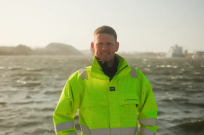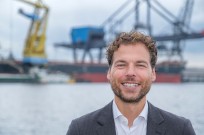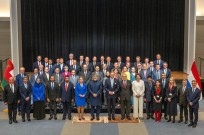In accordance with Article 3.7, Paragraph 2, Article 3.9, Article 3.11, Paragraph 4, Article 3.13, Paragraph 2, Item (a), Article 3.13, Paragraph 2, Item (e), Article 4.5, Paragraph 5, Article 4.11, Paragraph 7, Article 5.6, Paragraph 2, Article 5.7, Paragraph 2, and Article 7.1, Paragraph 2 of the Regional Port Byelaws for the North Sea Canal Area 2023 (hereinafter: RHN), the activities specified in these provisions must be reported to the Harbour Master Pursuant to Article 1.10 RHN, the reports must be submitted at the time and in the manner determined by the Harbour Ma
-

In 25 years, the Netherlands aims to have a fully circular economy. But how is the transition progressing? According to James Hallworth, Commercial Manager Circular Economy at Port of Amsterdam, it’s moving far too slowly: “Globally, we’re only at around eight percent. In the Netherlands, we’re fortunately closer to 25 percent, but there’s still a long way to go to reach the target of 50 percent by 2030. Current geopolitical tensions could actually be a major driver for accelerating the shift toward a circular economy.”
-

After ten years in various financial roles—five of which as Chief Financial Officer (CFO)—Alexander Kousbroek is leaving Port of Amsterdam. As of June 1, 2025, he will take on the role of CFO at Talpa Network.
To grant the applicant a permit to bunker methanol with the above-mentioned bunker ship Chicago within the municipalities of Amsterdam, Beverwijk, Velsen and Zaanstad.
Here you will find more information about what Port of Amsterdam stands for, press releases and press material such as images and downloads.
Go to:
Latest updates
Current themes
About Port of Amsterdam
Images and downloads
Contact our press officers
Port of Amsterdam is building a port that is helping to strengthen the international competitive position of the Amsterdam Metropolitan Area and of the Netherlands as a whole. We balance our roles and responsibilities with the interests of our stakeholders.
-

A groundbreaking Joint Development Agreement (JDA) has been signed to establish the world’s first liquid hydrogen import corridor, connecting the Sultanate of Oman, the Netherlands, and Germany. This corridor will link the port of Duqm in Oman, the port of Amsterdam in the Netherlands, and key logistics hubs in Germany, including the port of Duisburg in Germany, enabling the commercial-scale import of renewable fuel of non-biological origin (RFNBO) compliant liquid hydrogen to Europe. The agreement was signed during the state visit by His Majesty the Sultan of Oman to the Netherlands.